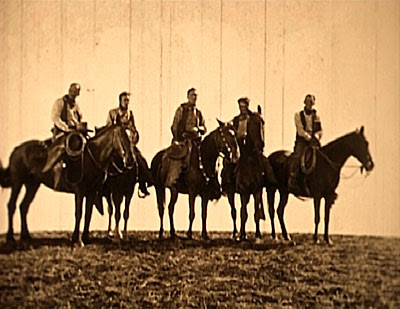Tumbleweeds
 Tumbleweeds is the last of silent Western star William S. Hart's 65 movies. As such, it encodes a double nostalgia. Its topic is the 1889 land rush in which homesteaders moved in on the "Cherokee Strip," an event that for Hart meant "the end of the West" (as his character in the movie puts it) as the cowpokes had to move out for the incoming settlers. But as Hart makes clear in his spoken prologue to the film's 1939 re-issue, the end of the West stands in for what he sees as the end of the Western: the end of his own cinematic career, but also the end of realism in Western cinema and the arrival of populism, comic devices, and epic metaphors.
Tumbleweeds is the last of silent Western star William S. Hart's 65 movies. As such, it encodes a double nostalgia. Its topic is the 1889 land rush in which homesteaders moved in on the "Cherokee Strip," an event that for Hart meant "the end of the West" (as his character in the movie puts it) as the cowpokes had to move out for the incoming settlers. But as Hart makes clear in his spoken prologue to the film's 1939 re-issue, the end of the West stands in for what he sees as the end of the Western: the end of his own cinematic career, but also the end of realism in Western cinema and the arrival of populism, comic devices, and epic metaphors. Ironically, and despite the legal battles that Hart undertook to keep his vision intact, Tumbleweeds follows the pattern of the new-style Western rather than the old style whose demise it marks. Hart's character, Don Carver, is supplied with a comic sidekick in Lucien Littlefield: the two are ranchers who have to move out with the arrival of the homesteaders. The film's scale is certainly epic, and both imagery and plot are littered with overt metaphor: in the film's opening scene, for instance, Carver rescues two wolf cubs who are defenceless now their mother has been poisoned, just as the cowpokes likewise have lost their source of life and nourishment. And yet in the end the movie sides with the homesteaders, in suitably populist style: both of the cowboy "tumbleweeds" find themselves hitched to women and accept a fixed claim on bounded territory.
Yet there is a point near the very end of the film at which such a homely resolution still seems in doubt. Under suspicion of grabbing land illegally and spurned by the woman he loves, Carver declares that he'll move South: "Women aren't reliable--cows are--that's why I'm headin' for South America where there's millions of 'em." In the end, Littlefield's character, Kentucky Rose, intervenes to ensure that Carver doesn't head towards what Rose terms "South Ameriky." But Latin America haunts this film as the option not taken, as a space in which the deterritorializing instincts of the Old West continue to dominate, where the tumbleweeds continue to roam.
Latin America becomes the last frontier, and if we follow Hart's overall metaphor through, it becomes too perhaps a cinematic frontier: an option the movies could take to avoid being tied down and domesticated.

YouTube link: Hart's prologue to the 1939 re-issue.
Labels: deterritorialization, westerns
